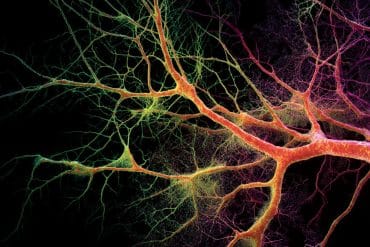Summary: Parents’ genes linked to both cognitive and non-cognitive skills affect their child’s educational outcomes, a new study reports.
Source: King’s College London
New research from the Institute of Psychiatry, Psychology & Neuroscience (IoPPN) at King’s College London shows that parents’ genes linked to cognitive and non-cognitive skills both affect children’s educational outcomes.
The research, published in Nature Communications, investigated educational records and genetic data on more than 40k children in the UK and The Netherlands, and found that parental genes can influence their children’s educational outcomes through the environment they create, even when the genetic factors are not inherited. This is known as an ‘indirect genetic effect’.
The researchers argue that understanding the mechanisms behind the transmission of educational outcomes from parents to their children could help to inform future strategies to combat inequality in education.
In education, ‘non-cognitive skills’ is an umbrella term used to describe characteristics such as academic motivation, social skills, learning strategies and perseverance. ‘Cognitive skills’ refers to traits like working memory and verbal IQ. Previous research has investigated how much children’s non-cognitive skills can influence their own educational outcomes.
However, little research has been conducted into the role of parents’ non-cognitive skills.
Additionally, research on how parents affect offspring education has generally not accounted for genetic inheritance, which is needed to establish how much parents’ genes truly affect children through the environment.
The investigators compared educational outcomes from three data sets – the UK Biobank, the UK Twins Early Development Study and the Netherlands Twins Register – to establish the environmental effects of parents’ genes on their children’s educational outcomes. Educational outcomes of the participating children included standardised test results and teacher-reported grades, as well as the total number of years that they were in education.
They established that parental genes for both cognitive and non-cognitive skills that are not inherited by their children still influence their child’s educational success. A parent’s genetic disposition can still be passed to their child even if it’s not inherited, as they are more likely to create an environment through which perseverance is able to flourish.

Although these genes are not passed on to children, they have a social impact via the environments that the parents create.
“Classic ‘parental nurture’ could be important – for example, genes influence parents to teach their child to stay focussed and motivated. But broader mechanisms are also key – for example, genetic predispositions play a role in a parent’s decision to move to a certain neighbourhood, which in turn influences the child’s education,” said Dr Rosa Cheesman.
Perline Demange, the study’s first author from Vrije Universiteit said, “We didn’t only use one genetic design in one dataset. The fact that our findings were broadly corroborated across the different methods and across studies gives us confidence to say that parental environment associated with cognitive and non-cognitive skills matter for their children’s educational success.
“Education is highly predictive of both social mobility and health over the course of someone’s life. By understanding the conditions for success, we can help to inform policy to give future generations the best possible start.”
About this neurodevelopment and genetics research news
Author: Press Office
Source: King’s College London
Contact: Press Office – King’s College London
Image: The image is in the public domain
Original Research: Open access.
“Estimating effects of parents’ cognitive and non-cognitive skills on offspring education using polygenic scores” by Perline A. Demange et al. Nature Communications
Abstract
Estimating effects of parents’ cognitive and non-cognitive skills on offspring education using polygenic scores
Understanding how parents’ cognitive and non-cognitive skills influence offspring education is essential for educational, family and economic policy.
We use genetics (GWAS-by-subtraction) to assess a latent, broad non-cognitive skills dimension. To index parental effects controlling for genetic transmission, we estimate indirect parental genetic effects of polygenic scores on childhood and adulthood educational outcomes, using siblings (N = 47,459), adoptees (N = 6407), and parent-offspring trios (N = 2534) in three UK and Dutch cohorts.
We find that parental cognitive and non-cognitive skills affect offspring education through their environment: on average across cohorts and designs, indirect genetic effects explain 36–40% of population polygenic score associations. However, indirect genetic effects are lower for achievement in the Dutch cohort, and for the adoption design.
We identify potential causes of higher sibling- and trio-based estimates: prenatal indirect genetic effects, population stratification, and assortative mating. Our phenotype-agnostic, genetically sensitive approach has established overall environmental effects of parents’ skills, facilitating future mechanistic work.






